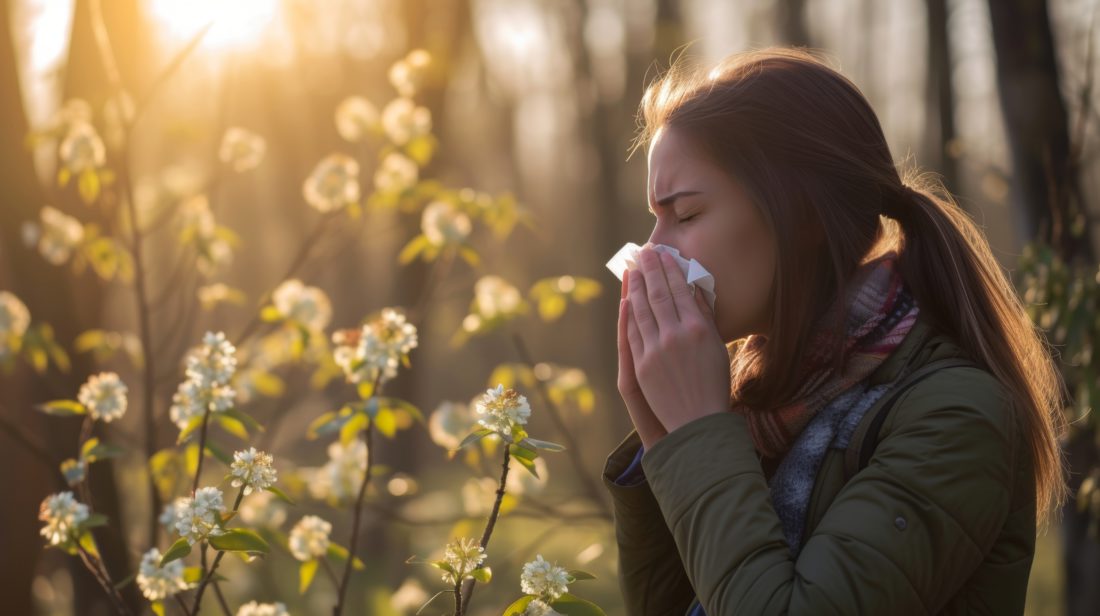Early summer is a beautiful time in Western North Carolina. For people who suffer from seasonal allergies, however, it’s not always pleasant. For more than 25% of people in the U.S., according to the national Centers for Disease Control and Prevention, the pollen from blooming trees and plants translates to sneezing, runny nose, itchy eyes, scratchy throat, hives, eczema and other uncomfortable symptoms.
As climate change creates longer growing seasons, the annual window for pollen is also expanding. Asheville-area health professionals tell Xpress they’re seeing itchy, sniffling allergy sufferers up to nine months of the year.
Dr. Jordan Smallwood, an allergist-immunologist with Allergy Partners of Western North Carolina, observed that this year’s allergy season began long before March 19, the first day of spring. “I started seeing spring allergy symptoms as early as February and expect they will last through June,” he says.
“Obviously, not everyone’s symptoms will be severe that entire time, and symptoms may fluctuate based on cooler and warmer temperatures,” he continues. “Over the past several years, I have seen tree pollen allergy symptoms starting earlier than expected and lasting longer than expected as well.”
Christy McCall, a family nurse practitioner with Medical Associates of Transylvania in Brevard and a lifelong WNC resident, has noticed her own seasonal allergies change depending on the chill. “If we have a winter when the temperature gets low for a long period of time, allergy season is going to be better the next year,” she says.
Likewise, a very late, heavy frost can be good news for allergy sufferers (although it’s bad for farmers). “With apple trees and [other spring-blooming plants], a heavy frost will basically stop the blooming process, so the allergies aren’t as bad that year,” says McCall.
Nothing to sneeze at
Allergic reactions occur when the body’s immune system mistakenly identifies a substance as dangerous. It attacks that substance by releasing histamines, which are the chemicals that cause the unpleasant symptoms.
However, individuals can experience different symptoms from the same allergens, says Smallwood. Spring tree pollen, for instance, may contribute to flares of eczema in some, but it is also an asthma trigger — sometimes leading to severely restricted breathing.
Other common symptoms are what Smallwood calls the “downstream effects of nasal congestion,” such as itchy eyes and coughing. “Many patients with environmental allergies will have headaches, more frequent sinus infections, sinus pain or pressure and fatigue due to difficulty sleeping from nasal blockage,” he explains.

Itchy eyes can swell and cause a condition called allergic conjunctivitis, which resembles pinkeye, McCall adds. Fatigue is another side effect, she says, “mainly just from being sort of chronically ill with the allergies.”
Professional help
So what can beleaguered WNC allergy sufferers do?
McCall and Smallwood advise starting with defensive action, such as regularly changing the filters on indoor air conditioning and heat pumps and keeping doors and windows shut as much as possible.
Smallwood emphasizes the importance of thoroughly washing hands. “So many people get pollen and other allergens on their hands without realizing it and then touch their eyes and nose, contributing to their symptoms,” he explains.
He also recommends regular house-cleaning to remove pollen from living areas, including vacuuming all carpeting at least twice a week and washing bedding in hot water once a week. “All of these can go a long way toward reducing exposure to your allergens,” says Smallwood.
As a primary care provider, McCall typically recommends that her patients first try over-the-counter antihistamines to alleviate allergy symptoms. She refers more severe cases to allergists like Smallwood, who can test for specific allergens and offer further treatment options.
Smallwood begins by listening to patients describe their symptoms and history. From there, he uses a combination of physical examination, allergy skin testing (applying small amounts of many potential allergens — such as pollens, pet dander and dust mites — to the skin to test for reactions) and sometimes lab tests to determine what triggers symptoms.
After testing, Smallwood reviews over-the-counter and prescription medications that could help relieve symptoms. For patients who have not had good results from such medicines or are tired of taking them, immunotherapy — also known as allergy shots — can be an option.
Immunotherapy administers gradually increased dosages of an allergen over time to reduce the sensitivity to the patient’s immune system. “Many people have achieved long-lasting relief from their allergies without the need for frequent medication because of these allergy treatments,” he says.
Some people swear by old-fashioned home remedies for allergies, such as eating local honey. “They say it’s kind of like doing allergy shots,” McCall says. “You’re actually ingesting the allergen itself from the bees that bring in the pollen from the surrounding area.”
Allergy sufferers may want to address other areas in their lives as well. Dr. Zachari Cahn, an acupuncturist, herbalist and practitioner of traditional Chinese medicine at Asheville Alternative Wellness Center, calls allergy symptoms a small part of a bigger picture.
“It’s complicated — allergies are not as simple as I think they’re made out to be,” he says. Cortisol, a hormone produced by stress, increases inflammation in the body, Cahn points out. And research shows that chronic, unchecked, inflammatory patterns significantly impact tissues that interact with the outside world, from the skin, eyes and mouth to nasal cavities, lungs and digestive tract — the parts of the body that experience allergic reactions.
Other factors, including blood sugar dysregulation, hormone imbalances, diet and thyroid health also contribute to an individual’s sensitivity to pollen and other allergens, Cahn continues. “Allergies are kind of our body’s way of letting us know, ‘Hey, your game is a little off, something’s not working here,’” he says.
When treating seasonal allergies, Cahn typically relies on a proprietary blend of research-based, natural compounds — herbs, nutrient-based supplements and chemical compounds — to address the inflammation that is at the root of the problem. But he starts by carefully explaining to patients the complex connection between overall health, the immune system and allergic reactions. Inflammation, he says, is “the low common denominator with chronic allergies most of the time.”
Size matters
Plant species’ individual pollination cycles, weather and geography are among the factors that determine the severity and length of pollen seasons, explains Shawn Taylor, spokesperson for the N.C. Department of Environmental Quality’s Division of Air Quality (NCDEQDAQ), which monitors and collects data on pollen.
In spring, tree pollens tend to be most prolific, starting with junipers and cedars early in the season and progressing to oaks, pines and maples. “As summer starts, we’ll see tree pollen decrease while grass and weed pollen increase,” says Taylor. “That trend will generally continue until the pollen season ends in October or November. Fall is the traditional ragweed season.”
The NCDEQDAQ collects and analyzes pollen samples from around February to October each year at its testing facility in Raleigh. For each 24-hour period Monday-Friday, it releases a detailed pollen report on the types of pollen that are prevalent and their severity, ranking them low, medium, high or very high.
Dr. Robert Bardon, professor of forestry at N.C. State University’s College of Natural Resources, agrees that not all pollen is created equal, especially when it comes to how various types trigger allergic reactions in humans.
Yellow powder, which comes from pine trees, is abundantly visible in the springtime, and it does trigger allergies. However, there are tinier, less visible culprits afoot as well. “Most of the allergies that we see are related to the hardwood pollen,” Bardon explains.
Bardon concurs with the health professionals who say the pollen season is lengthening. Data from the U.S. Environmental Protection Agency shows growing seasons, and therefore pollen seasons, have extended under a warming climate. And anecdotal evidence indicates that pollen season begins about a week earlier now than in years past, says Bardon.
In WNC’s mountainous terrain, plants and trees at higher elevations begin to pollinate when the same species at lower levels have already finished. Pollen grains can travel up to 50 miles on the wind, so this effectively prolongs the area’s pollen season.
“Until winter comes along and everything’s done pollinating, allergy sufferers don’t get a reprieve,” Bardon says.




Before you comment
The comments section is here to provide a platform for civil dialogue on the issues we face together as a local community. Xpress is committed to offering this platform for all voices, but when the tone of the discussion gets nasty or strays off topic, we believe many people choose not to participate. Xpress editors are determined to moderate comments to ensure a constructive interchange is maintained. All comments judged not to be in keeping with the spirit of civil discourse will be removed and repeat violators will be banned. See here for our terms of service. Thank you for being part of this effort to promote respectful discussion.